

What's The Difference Between Regular... In the context of verbs, we use the term inflection to talk about the process of changing a verb form to show tense, mood, number (i.e. singular or plural), and person (i.e. first person, second person, or third person).
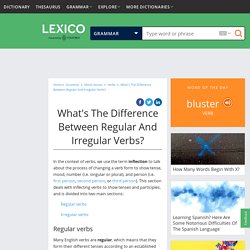
This section deals with inflecting verbs to show tenses and participles, and is divided into two main sections: Regular verbs Irregular verbs Regular verbs Many English verbs are regular, which means that they form their different tenses according to an established pattern. Present tense formation In the present simple tense, the basic form of a regular verb only changes in the 3rd person singular, as follows: Most verbs just add -s to the basic form (e.g. take/takes, seem/seems, look/looks). Participles. A participle is a word formed from a verb, usually by adding -d, -ed, or -ing.
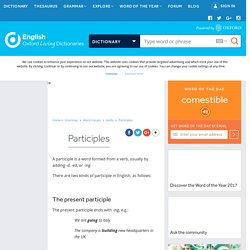
There are two kinds of participle in English, as follows: The present participle The present participle ends with -ing, e.g. Learning English. Prefixes and Suffixes. Today's topic is prefixes and suffixes, those little things you add to the front or back of words.
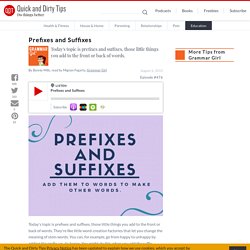
They're like little word-creation factories that let you change the meaning of stem words. You can, for example, go from happy to unhappy by adding the prefix un- to happy. You might do this when you add the suffix -ectomy to the word spleen to get splenectomy. Ooh, that sounds painful, a word you create by adding the suffix -ful to pain. On the other hand, we hope that our discussion of spelling and punctuation when it comes to prefixes and suffixes will be pain-free. What Are Affixes? Prefixes and suffixes are two examples of affixes, grammatical elements that are “added to a base or stem to form a fresh stem or a word.” (1) It might seem to make more sense for them to be called prefixes and postfixes, since pre- means “before” and post- means “after,” but it turns out that the suf part of “suffix” comes from the past participle of a Latin word that means “to attach on top of.” (2) Pages.
English Spelling - Rules and Common Mistakes. Adding Suffixes: To Double or Not to Double Consonants. Do you ever wonder if you should double a letter when adding a suffix?
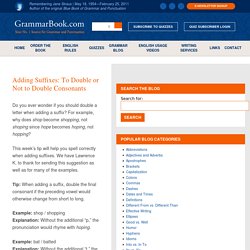
For example, why does shop become shopping, not shoping since hope becomes hoping, not hopping? This week’s tip will help you spell correctly when adding suffixes. We have Lawrence K. to thank for sending this suggestion as well as for many of the examples. Tip: When adding a suffix, double the final consonant if the preceding vowel would otherwise change from short to long. Example: shop / shoppingExplanation: Without the additional “p,” the pronunciation would rhyme with hoping. Example: bat / battedExplanation: Without the additional “t,” the pronunciation would rhyme with gated. Of course, what kind of English rule would we have without exceptions? According to the tip, transit and profit should both have their consonants doubled when adding a suffix. Examples:transit / transited / transiting profit / profited / profiting Example: travel / traveling OR travelling (British preference) Pop Quiz 1. 2. 3. 4. 5.
Inflections. Babiesbadlybeginningboxesbrushesbusilybuyingbuyscheaperchiefscoldercriedcruellydanceddieddoeseasiesteasilyendingenjoyedfeetgrowinghappeninghappierhidinghittinghopinghotterleavesliveslongestlouderluckilylyingmarryingmicepaidpianosplayedpolitelypotatoespreferredsayingseeingsheepshoppingsimplyskiingstoppedstupidestteeththinnesttreestriestryingvisitedwarmestwatcheswomenwriting.
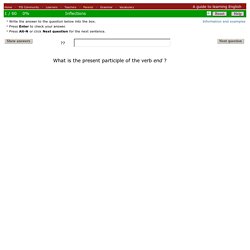
Unit 6 Exercise 1: Present continuous (Spelling variations) Students > Champions > Starter > Grammar > Unit 6 Exercise 1: Present continuous (Spelling variations) Exercise 1: Present continuous (Spelling variations) Choose the correct answer.
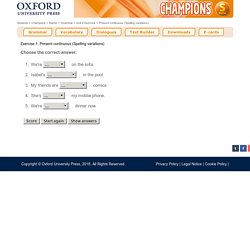
We're on the sofa. Isabel's in the pool. My friends are comics. AddThis Sharing Buttons.
Irregular Verbs. English Grammar 101 - Verbs: Types, Tenses, and Moods, Lesson 7: Irregular Verbs. Irregular Past Tense and Past Participles Here are a few basics you'll want to remember about the irregular past tense and past participle forms.
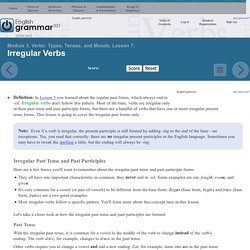
They all have one important characteristic in common: they never end in -ed. Some examples are ate, fought, swam, and given. It's very common for a vowel (or pair of vowels) to be different from the base form. Began (base form, begin) and froze (base form, freeze) are a two good examples. Let's take a closer look at how the irregular past tense and past participles are formed. Past Tense With the irregular past tense, it is common for a vowel in the middle of the verb to change instead of the verb's ending. Irregular verbs - 01. My dog has never ________(bite) anyone.Have you ___________ (buy) any new clothes this week?
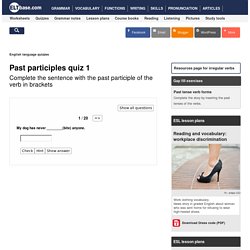
He's been fishing for three house but he hasn't _________ (catch) a fish yet.How much work have you _________ (do) today? Have you ever _____________ (drink) too much wine? He hasn't _____________ (drive) a car since the accident.She's never __________ (eat) snake.Henry flies helicopters. Adding endings to words that end in -y. When adding endings to words that end with a consonant plus -y, change the final y to i (unless the ending in question, such as -ish, already begins with an i).
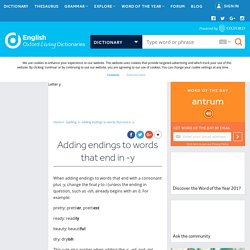
Suffix and Prefix Spelling Rules. IRREGULAR VERBS. Verbs. Verb forms quiz. Verb forms quiz. Verb forms quiz. Verb forms quiz. Verb forms quiz.